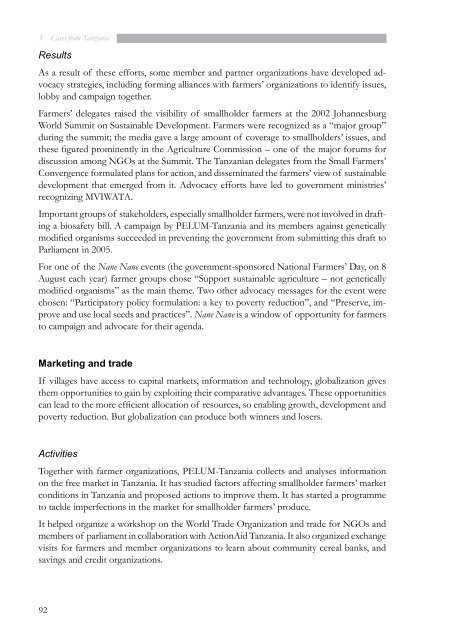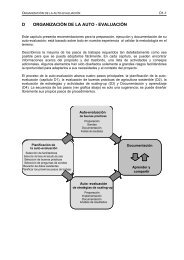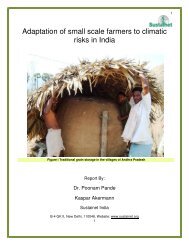cases from tanzania - Sustainet
cases from tanzania - Sustainet
cases from tanzania - Sustainet
Create successful ePaper yourself
Turn your PDF publications into a flip-book with our unique Google optimized e-Paper software.
3 Cases <strong>from</strong> Tanzania<br />
Results<br />
As a result of these efforts, some member and partner organizations have developed advocacy<br />
strategies, including forming alliances with farmers’ organizations to identify issues,<br />
lobby and campaign together.<br />
Farmers’ delegates raised the visibility of smallholder farmers at the 2002 Johannesburg<br />
World Summit on Sustainable Development. Farmers were recognized as a “major group”<br />
during the summit; the media gave a large amount of coverage to smallholders’ issues, and<br />
these figured prominently in the Agriculture Commission – one of the major forums for<br />
discussion among NGOs at the Summit. The Tanzanian delegates <strong>from</strong> the Small Farmers’<br />
Convergence formulated plans for action, and disseminated the farmers’ view of sustainable<br />
development that emerged <strong>from</strong> it. Advocacy efforts have led to government ministries’<br />
recognizing MVIWATA.<br />
Important groups of stakeholders, especially smallholder farmers, were not involved in drafting<br />
a biosafety bill. A campaign by PELUM-Tanzania and its members against genetically<br />
modified organisms succeeded in preventing the government <strong>from</strong> submitting this draft to<br />
Parliament in 2005.<br />
For one of the Nane Nane events (the government-sponsored National Farmers’ Day, on 8<br />
August each year) farmer groups chose “Support sustainable agriculture – not genetically<br />
modified organisms” as the main theme. Two other advocacy messages for the event were<br />
chosen: “Participatory policy formulation: a key to poverty reduction”, and “Preserve, improve<br />
and use local seeds and practices”. Nane Nane is a window of opportunity for farmers<br />
to campaign and advocate for their agenda.<br />
Marketing and trade<br />
If villages have access to capital markets, information and technology, globalization gives<br />
them opportunities to gain by exploiting their comparative advantages. These opportunities<br />
can lead to the more efficient allocation of resources, so enabling growth, development and<br />
poverty reduction. But globalization can produce both winners and losers.<br />
Activities<br />
Together with farmer organizations, PELUM-Tanzania collects and analyses information<br />
on the free market in Tanzania. It has studied factors affecting smallholder farmers’ market<br />
conditions in Tanzania and proposed actions to improve them. It has started a programme<br />
to tackle imperfections in the market for smallholder farmers’ produce.<br />
It helped organize a workshop on the World Trade Organization and trade for NGOs and<br />
members of parliament in collaboration with ActionAid Tanzania. It also organized exchange<br />
visits for farmers and member organizations to learn about community cereal banks, and<br />
savings and credit organizations.<br />
92




